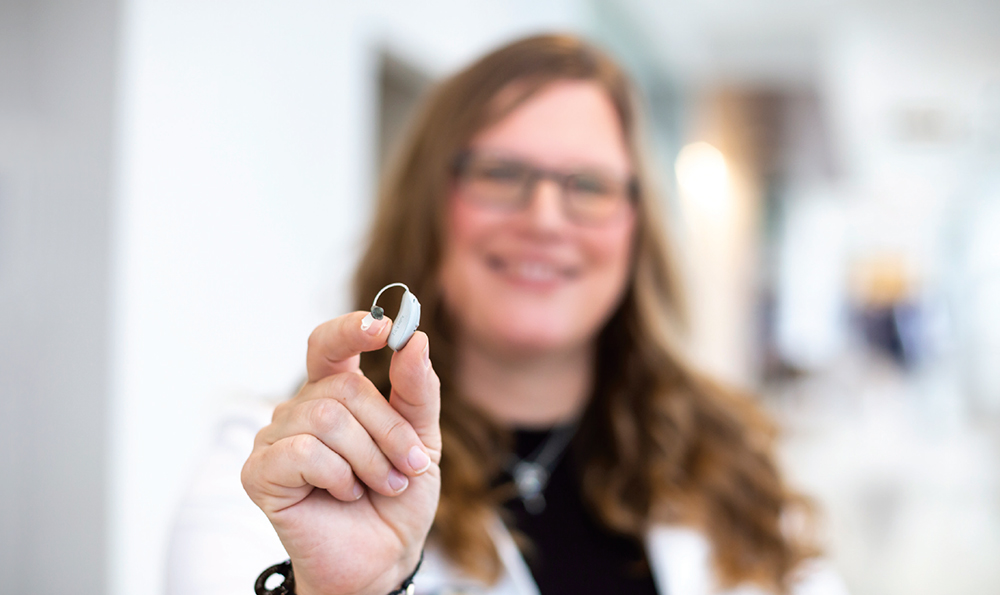Health & Wellness

As consumers, it can be exciting when healthcare items transition from prescription to over-the-counter (OTC) access. We tend to feel more in control of our care. And, in many cases, it allows us to purchase, use, and see the benefits on a daily basis.
In late 2022, the U.S. Food and Drug Administration (FDA) finalized a ruling allowing OTC hearing aids to be obtained without a medical exam, prescription, or professional fitting. This can be great news for adults with mild to moderate hearing loss or those who suffer from tinnitus, particularly those without access to a nearby audiologist.
However, these OTC hearing aids are no substitute for regular exams or hearing tests from an audiologist or hearing health professional, or for adults with more than mild/moderate hearing loss.
Our Doctor of Audiology, Eryn Staats, has worked as a clinical audiologist for nearly 20 years, providing comprehensive diagnostic services for patients for a variety of hearing healthcare services. She shares the following Five-Step Checklist for those with hearing loss, as they consider a hearing aid option.
Step 1 – Schedule a baseline hearing test
First and foremost, Eryn points out that hearing loss can occur at any age, so there is not a set age to start screening. Hearing loss can emerge from heredity issues or noise exposure, as well as from aging factors, so it is always recommended to have a baseline hearing test. This will allow your audiologist to determine the level of hearing loss you are experiencing or diagnose any hearing conditions.
She continues, “While we cannot predict hearing loss, we are able to see trends, so having the initial hearing test to compare to is a great way to monitor your overall hearing.”
Step 2 – Discuss your hearing health evaluation
After your hearing test and evaluation, discuss your options with your audiologist or hearing care specialist. If hearing loss has been determined, next steps can range from OTC hearing aids to custom-programmed hearing aids. Eryn adds, “As your audiologist, my goal is to ensure your hearing improves for you and your lifestyle. We want to help you enjoy all that life has to offer! If that includes an OTC hearing aid, I will be honest with you and help guide you.”
If custom hearing aids are recommended, your audiologist can help you understand the realistic expectations of these options, as well as details on each hearing aid and its style, technology, features, and more.
Step 3 – Understanding the differences between custom and OTC
OTC hearing aids are self-fitting, meaning the user will select how they are fitted without the helpful expertise or support of a professional.
Conversely, custom hearing aids are precisely programmed to your exact hearing loss. The audiologist will also verify that the fit is ideal and the settings match your hearing needs.
While the convenience of OTC hearing aids is a plus, it does raise some concerns for hearing specialists. Hearing loss could be caused by an underlying medical problem – which may not be diagnosed if the OTC route is chosen. Unfortunately, this may affect or damage hearing long-term – an issue that could be avoided with proper evaluations.
Step 4 – Think about post-purchase services
When deciding between OTC and custom-programmed hearing aids, do consider what will happen down the road with your purchase. Think about when your hearing aid requires maintenance, adjustment, or cleaning.
Audiology specialists can provide the support to examine your ears, check your hearing, and adjust the fit and programming of your device, in addition to providing regular device cleanings and maintenance. At Memorial Ear, Nose & Throat, these services are all covered for the duration of the device’s warranty.
Step 5 – Consider your whole hearing health care
Working with an ENT and Audiology team of specialists allows them to monitor, evaluate, and treat all of your hearing needs – from wax removal to tinnitus to dizziness and balance disorders.
Hearing loss can be confusing. And frustrating. But having an expert medical team to walk you through the process of prevention, detection, assessment, and treatment can ease you in, step-by-step, with realistic expectations.
To learn more, call Memorial Ear, Nose & Throat at (937) 578-4300.



